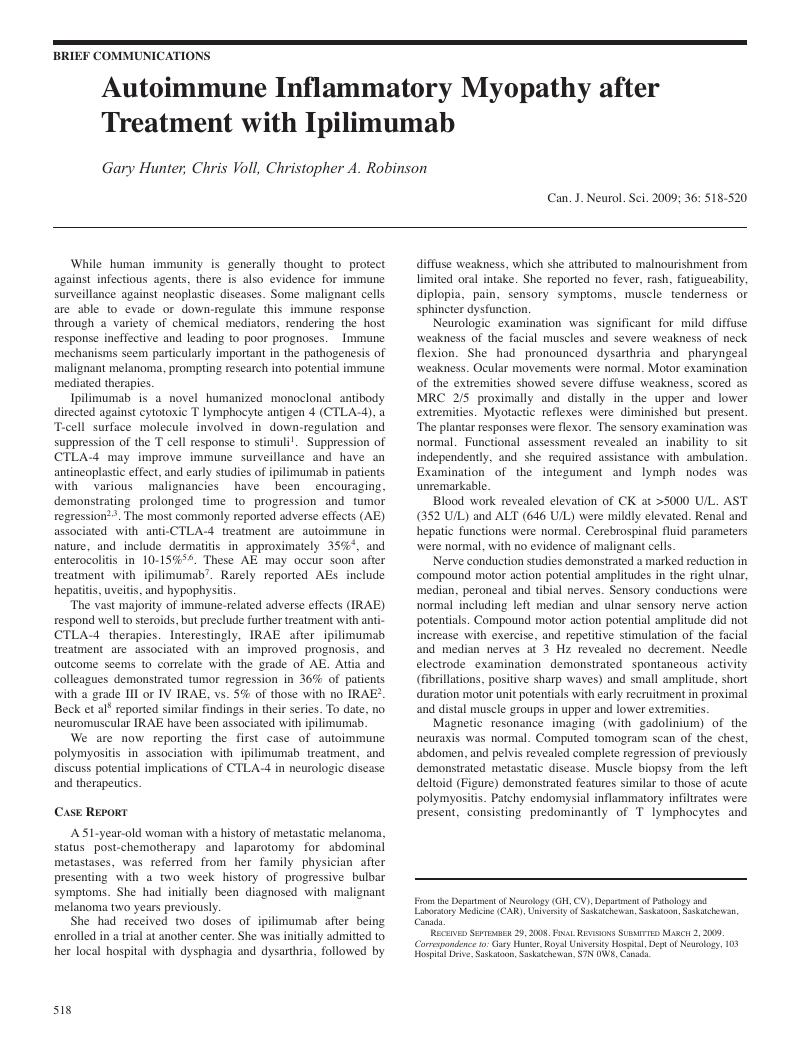Crossref Citations
This article has been cited by the following publications. This list is generated based on data provided by Crossref.
2010.
Current World Literature.
Current Opinion in Rheumatology,
Vol. 22,
Issue. 6,
p.
704.
Boasberg, Peter
Hamid, Omid
and
O’Day, Steven
2010.
Ipilimumab: Unleashing the Power of the Immune System Through CTLA-4 Blockade.
Seminars in Oncology,
Vol. 37,
Issue. 5,
p.
440.
Di Giacomo, Anna Maria
Biagioli, Maurizio
and
Maio, Michele
2010.
The Emerging Toxicity Profiles of Anti–CTLA-4 Antibodies Across Clinical Indications.
Seminars in Oncology,
Vol. 37,
Issue. 5,
p.
499.
O'Regan, Kevin N.
Jagannathan, Jyothipriya P.
Ramaiya, Nikhil
and
Hodi, F. Stephen
2011.
Radiologic Aspects of Immune-Related Tumor Response Criteria and Patterns of Immune-Related Adverse Events in Patients Undergoing Ipilimumab Therapy.
American Journal of Roentgenology,
Vol. 197,
Issue. 2,
p.
W241.
Bronstein, Yulia
Ng, Chaan S.
Hwu, Patrick
and
Hwu, Wen-Jen
2011.
Radiologic Manifestations of Immune-Related Adverse Events in Patients With Metastatic Melanoma Undergoing Anti–CTLA-4 Antibody Therapy.
American Journal of Roentgenology,
Vol. 197,
Issue. 6,
p.
W992.
Bompaire, Flavie
Mateus, Christine
Taillia, Hervé
De Greslan, Thierry
Lahutte, Marion
Sallansonnet-Froment, Magali
Ouologuem, Madani
Renard, Jean-Luc
Gorochov, Guy
Robert, Caroline
and
Ricard, Damien
2012.
Severe meningo-radiculo-nevritis associated with ipilimumab.
Investigational New Drugs,
Vol. 30,
Issue. 6,
p.
2407.
Specenier, Pol
2012.
Ipilimumab in melanoma.
Expert Review of Anticancer Therapy,
Vol. 12,
Issue. 12,
p.
1511.
Fecher, Leslie A.
Agarwala, Sanjiv S.
Hodi, F. Stephen
and
Weber, Jeffrey S.
2013.
Ipilimumab and Its Toxicities: A Multidisciplinary Approach.
The Oncologist,
Vol. 18,
Issue. 6,
p.
733.
Callahan, Margaret K.
Postow, Michael A.
and
Wolchok, Jedd D.
2013.
Immunomodulatory therapy for melanoma: Ipilimumab and beyond.
Clinics in Dermatology,
Vol. 31,
Issue. 2,
p.
191.
Callahan, Margaret K.
Postow, Michael A.
and
Wolchok, Jedd D.
2013.
Cancer Immunotherapy.
p.
287.
Tarhini, Ahmad
2013.
Immune-Mediated Adverse Events Associated with Ipilimumab CTLA-4 Blockade Therapy: The Underlying Mechanisms and Clinical Management.
Scientifica,
Vol. 2013,
Issue. ,
p.
1.
Delyon, J.
Mateus, C.
Lefeuvre, D.
Lanoy, E.
Zitvogel, L.
Chaput, N.
Roy, S.
Eggermont, A.M.M.
Routier, E.
and
Robert, C.
2013.
Experience in daily practice with ipilimumab for the treatment of patients with metastatic melanoma: an early increase in lymphocyte and eosinophil counts is associated with improved survival.
Annals of Oncology,
Vol. 24,
Issue. 6,
p.
1697.
Voskens, Caroline J.
Goldinger, Simone M.
Loquai, Carmen
Robert, Caroline
Kaehler, Katharina C.
Berking, Carola
Bergmann, Tanja
Bockmeyer, Clemens L.
Eigentler, Thomas
Fluck, Michael
Garbe, Claus
Gutzmer, Ralf
Grabbe, Stephan
Hauschild, Axel
Hein, Rüdiger
Hundorfean, Gheorghe
Justich, Armin
Keller, Ullrich
Klein, Christina
Mateus, Christine
Mohr, Peter
Paetzold, Sylvie
Satzger, Imke
Schadendorf, Dirk
Schlaeppi, Marc
Schuler, Gerold
Schuler-Thurner, Beatrice
Trefzer, Uwe
Ulrich, Jens
Vaubel, Julia
von Moos, Roger
Weder, Patrik
Wilhelm, Tabea
Göppner, Daniela
Dummer, Reinhard
Heinzerling, Lucie M.
and
Soyer, H. Peter
2013.
The Price of Tumor Control: An Analysis of Rare Side Effects of Anti-CTLA-4 Therapy in Metastatic Melanoma from the Ipilimumab Network.
PLoS ONE,
Vol. 8,
Issue. 1,
p.
e53745.
Manousakis, Georgios
Koch, James
Sommerville, R. Brian
El‐Dokla, Ahmed
Harms, Matthew B.
Al‐Lozi, Muhammad T.
Schmidt, Robert E.
and
Pestronk, Alan
2013.
Multifocal radiculoneuropathy during ipilimumab treatment of melanoma.
Muscle & Nerve,
Vol. 48,
Issue. 3,
p.
440.
Liao, B.
Shroff, S.
Kamiya-Matsuoka, C.
and
Tummala, S.
2014.
Atypical neurological complications of ipilimumab therapy in patients with metastatic melanoma.
Neuro-Oncology,
Vol. 16,
Issue. 4,
p.
589.
Yust-Katz, Shlomit
and
Gilbert, Mark R.
2014.
Abeloff's Clinical Oncology.
p.
822.
Bertrand, Anne
Kostine, Marie
Barnetche, Thomas
Truchetet, Marie-Elise
and
Schaeverbeke, Thierry
2015.
Immune related adverse events associated with anti-CTLA-4 antibodies: systematic review and meta-analysis.
BMC Medicine,
Vol. 13,
Issue. 1,
Krecké, Nathalie
Zimmer, Anna
Friesenhahn-Ochs, Bettina
Müller, Cornelia S. L.
Vogt, Thomas
and
Pföhler, Claudia
2016.
Sneaky side effects and ineffectiveness of an immunotherapy with ipilimumab in a case of metastatic melanoma.
Dermato-Endocrinology,
Vol. 8,
Issue. 1,
p.
e1199307.
Abdel-Wahab, Noha
Shah, Mohsin
Suarez-Almazor, Maria E.
and
Nishikawa, Hiroyoshi
2016.
Adverse Events Associated with Immune Checkpoint Blockade in Patients with Cancer: A Systematic Review of Case Reports.
PLOS ONE,
Vol. 11,
Issue. 7,
p.
e0160221.
Wick, Mark R.
and
Gru, Alejandro A.
2016.
Metastatic melanoma: Pathologic characterization, current treatment, and complications of therapy.
Seminars in Diagnostic Pathology,
Vol. 33,
Issue. 4,
p.
204.





